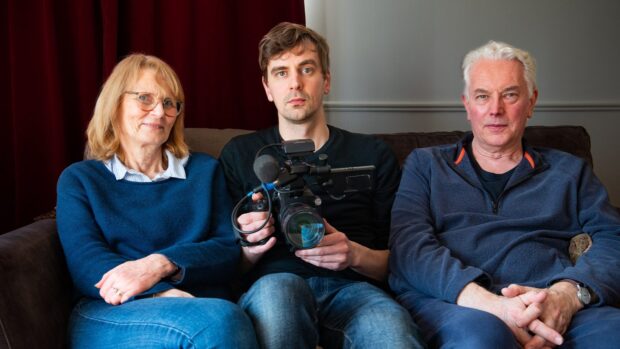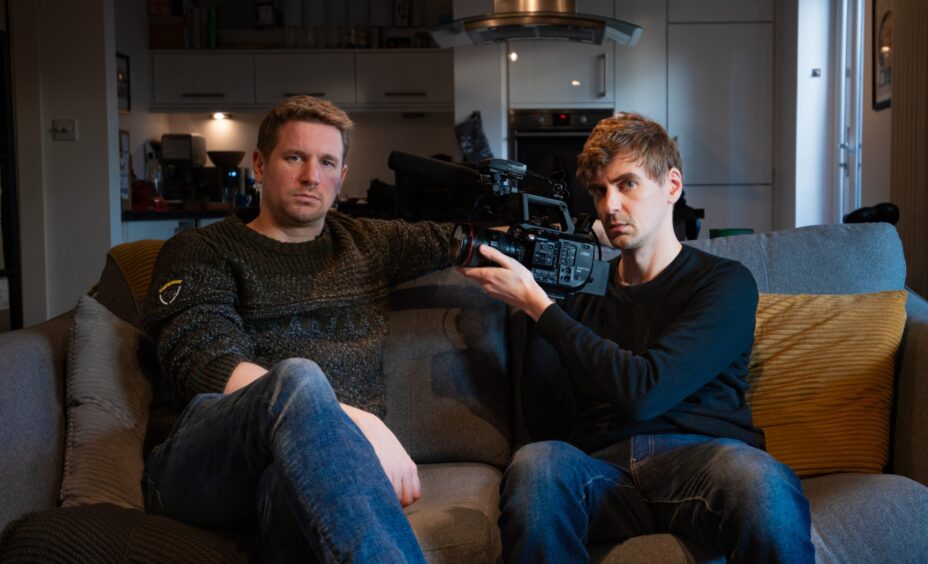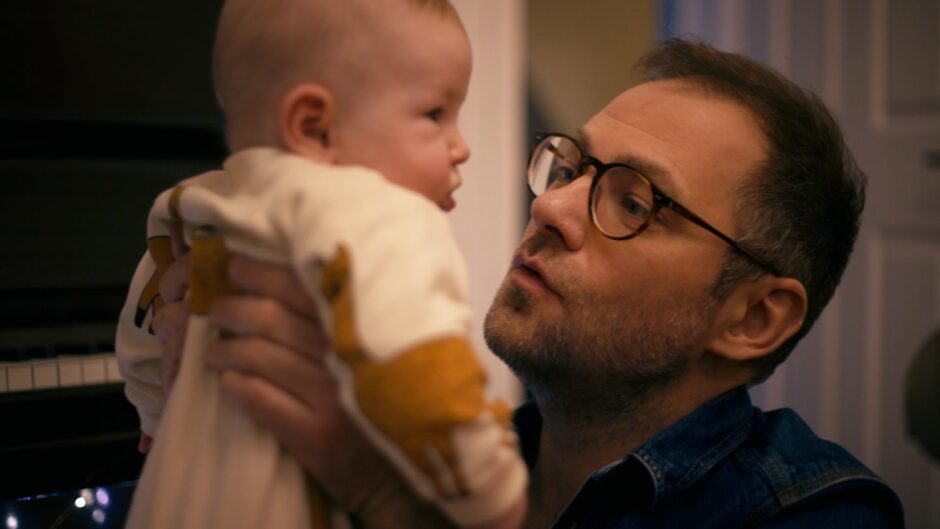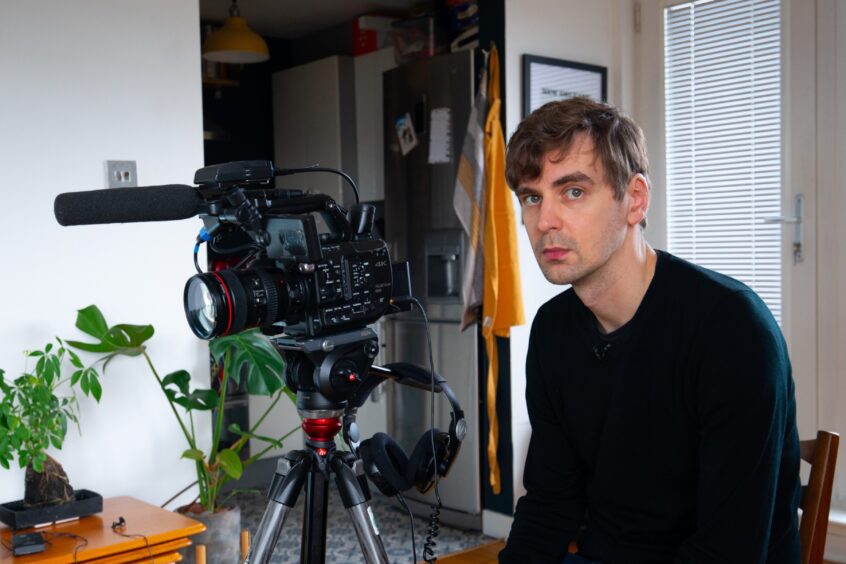
Moments after the credits had rolled at a screening of his debut feature-length documentary, Duncan Cowles was approached by an audience member.
“He came up to me and said he had never told his dad he loved him, and was going to do so right now,” Duncan recalled. “He went straight outside and called him.
“It was such a moving thing to see happen in front of me, and that alone made it all worthwhile. There’s a lot of fears around being that vulnerable, which I think people find relatable.”
Scottish Bafta winner Duncan’s film, Silent Men, tackles male mental health and men’s reluctance to be open about their feelings.
Putting himself at the centre of the movie and examining his relationship with his stoic dad, Duncan was unsure how the film would translate to wider audiences, so he was buoyed by the reaction.
“There is so much self-doubt in filmmaking and you wonder if people will even want to watch it,” he admitted. “Getting people to go and see an independent documentary about mental health isn’t the easiest sell, so to have people say things like that guy did was a nice feeling.”
Silent Men
Duncan began working on the film in 2016, when he was 26. Eight years on, it will be released in cinemas around the country from November 19 – International Men’s Day.
The Royal Television Society Award-winning director decided to make the film after growing concerned about his inability to address his feelings to his parents and partner. It led him to interview other men of different ages and backgrounds about their mental health and ability to be open.
“I was aware I had these issues about not being able to open up more. I couldn’t seem to be able to tell my family I loved them or to hug my dad. I know those are things that would seem quite small to some people, but I could feel myself getting worse – shutting down more as I got older,” Duncan, from Edinburgh, continued.
“It was almost like there were two paths in front of me – try to do something about it and make the film or avoid it and ignore it and who knows where that would end up. The statistics around male mental health frightened me into doing something – it bothered me that I couldn’t do these things.
“The longer you leave them, the worse they get, and they grow within you and become bigger issues than maybe they really are. They can lie dormant, and you believe that’s just the way it is.”
Men’s mental health
Suicide remains the biggest killer of men under 50 in the UK – and Scotland has the highest rate of suicide deaths in the UK.
The rate of death by suicide in men is more than three times that for females, and the number of suicides increased last year.
“When I started the film, there was quite a lot of press around male mental health – lots of statistics. That was part of the motivation to make it. In the seven years in between, the conversation disappeared a little and that’s due to a number of things, like Covid,” said Duncan, who also made the BBC series Scary Adult Things.
“It’s become more of a discussion again and there’s certainly more organisations raising awareness, but if you look at the cold hard statistics they haven’t shifted much – and in some cases are slightly worse. It’s quite strange, more is being done than ever, but whether it’s making a tangible difference is quite hard to tell at the moment.
“I like to think it’s making a difference – maybe it will take a generational shift or more time to pass before we notice. It’s something I think about a lot. For all the talk, it’s hard to see the difference at times.”
Duncan examines that generational shift in his own family, from his grandfather who wrestled with alcoholism, down to his dad, Steve, who prefers not to talk about emotions, then Duncan and his brother, Alex, who find it difficult to express their feelings.
‘Hopefully over generations it can change’
“When my dad was growing up, there was no real awareness of expressing emotions,” the filmmaker said. “He had an alcoholic father, which couldn’t have been easy. He learned how to be a father from someone who was struggling with addiction issues.
“A lot of it is passed down, but hopefully now we can be more aware and over generations it will change.”
In the film, Duncan interviews Paul from Newcastle, who keeps so much of his emotion inside that his marriage ended and he contemplated suicide. “Sometimes it’s easier to connect with a stranger than someone close to you, and we both felt that,” Duncan said.
“He knew he had an issue but refused to – or couldn’t – do anything about it. We related to each other on that, and he became the backbone of the film.”
He also interviewed Ainslie, a friend from art college, who explained how becoming a father had changed his mindset and the way he opens up about his feelings.
But what of Duncan’s dad, Steve, and his thoughts on the film?
“He’s watched it a couple of times. Once, with me and my mum, where he laughed a lot and said he enjoyed it but maybe struggled to focus on it as there’s a lot to take in, and then with an audience in Edinburgh, where he said he was less distracted about him being in it.
“He focused on the structure of it, which I thought was interesting because it’s the least emotional feedback you can give,” Duncan laughed. “But I think he gets it. We hug each other every time we meet and every time we leave, and before starting on this I couldn’t tell you the last time we hugged. He knows the importance of it to me.
“I was never asking him to change – it was more about me being able to open up and he acknowledged that. Our relationship probably doesn’t look like it’s changed, but there has been a shift. We’re more at peace with each other and it’s strengthened our relationship.”
Despite the heavy subject matter, Silent Men has frequent moments of humour to provide levity.
Duncan said: “It’s a serious topic, so I knew I needed that balance to make it accessible. It probably depends on people’s sense of humour and whether they find my miserable voice funny! But I think people are surprised by how funny it is and hopefully word-of-mouth will spread and bring more people to the film.”
Silent Men will be shown in cinemas across the UK from next week, with special regional screenings being introduced by representatives from men’s mental health charity Andy’s Man’s Club, with the chance to chat post-screening in a quiet space.
Duncan added: “I’m not perfect at expressing my emotions, but small tweaks I’ve made have had a big impact on my life. I still worry about things, but I feel more confident and assured. I’ve made good improvements without changing my entire personality.”

Enjoy the convenience of having The Sunday Post delivered as a digital ePaper straight to your smartphone, tablet or computer.
Subscribe for only £5.49 a month and enjoy all the benefits of the printed paper as a digital replica.
Subscribe © Supplied
© Supplied © Supplied
© Supplied © Supplied
© Supplied